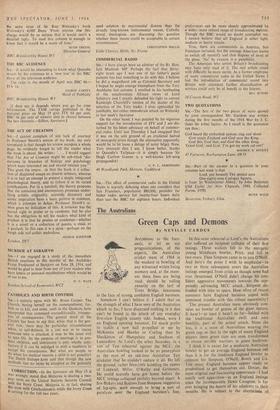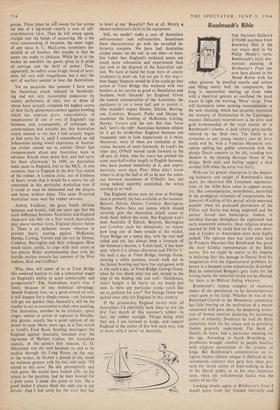The Australians
Green Caps and Demons
By NEVILLE CARDUS
ACCORDING to the fore- casts, or let us say prognostications, of the experts, the Australian cricket team of 1964 is the weakest in bowling of any witnessed within living
memory and, at the mom- ent these lines are being read, should be toiling sweatily on the turf of Trent Bridge, innocuous in the face of strong, confident English batsmen.
Somehow I can't believe it. I admit that on the strength of what I have seen of the Australian attack so far, I have discerned nothing in it that can't be found in the attack of any everyday first-class English county side. Indeed, were I an England opening batsman, I'd much prefer to tackle a new ball propelled at me by McKenzie and Hawke or Corling than by Shackleton of Hampshire and Statham of Lancashire. At Lord's the other Saturday, in a sort of Test rehearsal against the MCC, the Australian bowling looked to be so pennyplain in the eyes of an old-time Australian Test cricketer that he couldn't endure it all. He left the ground, rather feverishly babbling the names of Lindwall, Miller, O'Reilly and Grimmett. He could scarcely have got home before the MCC innings collapsed pitifully beyond repair. A few flickers and flexions from Simpson, suggestive of leg-spin, were enough to bring a sort of paralysis over the England batsmen's feet. In this same rehearsal at Lord's, the Australians also suffered an incipient collapse of their first innings. Three wickets fell to the energetic young Middlesex bowler, Price, and fell in two overs. Then Simpson came in to join O'Neill. And here's the point I wish to emphasise—in two or three subsequent overs the Australian innings emerged from crisis as though none had ever threatened. O'Neill didn't change his con- fident aggressive movements towards the sup- posedly advancing MCC attack. Simpson de- fended with time to spare. How often of recent summers have England batsmen coped with imminent trouble with this reliant equanimity?
The present Australian team obviously con- tains no bowler of genius of the gant stature. It hasn't—at least it hasn't so far—fielded with the traditional Australian swift and sure hostility, part of the actual attack. None the less, it is a team of Australians wearing the green cap, so that in the sight of many England players these green caps are soon transformed to eleven terrible warriors in green buckram.
I think it is easier for a mediocre Australian bowler to get an average England batsman out than it is for the mediocre England bowler to account for Simpson, O'Neill, Booth and Co. Too many England batsmen appear ready or predestined to get themselves out. Dexter, the most original and fascinating appearance—I had nearly said apparition—in an England innings since the incomparable Denis Compton, is for ever bringing the hearts of his admirers to their mouths. He is subject to the aberrations of
genius. Three times he win sweep his bat across the line of a leg-break—nearly a case of self- extermination 1.b.w. Then he will sweep again, straight into the hands of square-leg. He is the most commanding of batsmen, the most regal, of any since A. C. MacLaren, sometimes dis- dainful of all bowlers. His trouble is that he seems too ready to abdicate. While he is at the wicket he ennobles the game, gives to it pride of carriage and the thrill of power. Then, apparently, he suffers some kingly mood of bore- dom. All very well; magnificent, but it isn't the sort of warfare needed to beat the Australians.
Yet on occasions this summer I have seen the Australian attack reduced to hardwork- ing and not very resourceful endeavour by county performers of ours, two or three of whom have actually compiled the highest scores of their fairly anonymous careers against bowling which has exposed grave vulnerabilities of temperament in one or two of England's top batsmen, and, consequently, of technique. So commonplace and amiable has this Australian attack seemed to me that 1 had actually begun to feel sorry for it, until I remembered an old Johnsonian saying which experience of Austral- ian cricket caused me to amend—'Don't feel compassionate about any Australian team in advance. Knock them down first, and feel sorry for them afterwards.' In 1909, an Australian team came to England, lost to the MCC, to two counties, then to England in the first Test match of the rubber. A London critic, out of kindness of heart, wrote that it would be a mercy for all concerned in this particular Australian tour if it could at once be disbanded and the players sent home without delay. This same ill-starred Australian team won the rubber two-one.
Aubrey Faulkner, the great South African batsman and bowler, told me years ago that the main difference between Australian and England cricketers was this—in a Test match Australians play above normal form, England players below it. There is no technical reason whatever to prevent heavy scoring against McKenzie, Hawke, Coding, Veivers and the rest by Dexter, Cowdrey, Barrington and their colleagues. How much easier, surely, to cope with their more or less precise Bisley marksmanship than with the horrific nuclear assaults last summer of the West Indians, Hall and Griffiths!
Why, then, will many of us at Trent Bridge this weekend hesitate to risk a substantial wager on England's ability to score comfortably and prosperously? The Australians won't win, I fancy, because of any technical advantage. Should England lose, on a good stretch of turf, it will happen for a simple reason—our batsmen will get out quicker than Australia's, will be the readier to act as accessories to their own undoing. The Australian, whether he be cricketer, opera singer, soldier in action or aspirant to Wimble- don glories, usually has a good opinion of his power to cope. Many years ago, in a Test match at Lord's, Fred Root, bowling inswingers for England against Australia, knocked over the leg-stump of Herbert Collins, the Australian captain, in the game's first minutes. C. G. Macartney was the next batsman in, and as he walked through the Long Room on the way to the wicket, he flashed a glance at me, made an ominous gesture with his bat, and said:
attend to this cove.' He did, peremptorily and with gusto. He would have looked silly, on his return to the pavilion, had he been bowled for a poor score. I made this point to him. 'On a good wicket I always think the odds are in my favour. And I feel sorry for the cove that has to bowl at me.' Boastful? Not at all. Merely a master-technician's faith in his equipment.
Still, we needn't make a cant of Australian self-assurance and self-assertion. Sometimes these characteristics go with the so-called in- feriority complex. We have had Australian cricket teams `on the run' in our time—at least, lim Laker has. England's technical assets are much more substantial and experienced than any now at the disposal of the Australian cap- tain. We have at hand the large store of county cricketers to draw on. Let me put it this way— how happy Simpson would be if he could go into action at Trent Bridge this weekend with two bowlers at his service as good as Shackleton and Statham, both 'discards' for England. Given the mental concentration of the Australian, the quickness to see a loose ball and to punish it, who wouldn't expect Dexter, Edrich, Barring- ton, Cowdrey, Boycott, Parks and Sharpe to annihilate the bowling of McKenzie, Coding, Hawke, Veivers and the rest. But that 'loose ball,' here's the rub! Australian batsmen seldom let it go by stroke-free. England batsmen too frequently wait to look suspiciously at it twice. Moreover, most of them are immobile at the crease, because of static footwork. At Lord's the other day, O'Neill moved yards forward to the off-spin of Allen, who for years has pitched the same near-half-volley length to English batsmen, who have pushed tentatively at it, and unpro- ductively, most days. Poor Allen didn't know where to drop the ball at all as he saw the omin- ous forward movement of O'Neill's feet, bat rising behind superbly controlled, the wrists steering to an inch.
The England eleven now on view at Notting- ham is probably the best available at the moment. Boycott, Edrich, Dexter, Cowdrey, Barrington, Sharpe, Parks—here are names which should certainly give the Australian attack cause to think hard, before the event. But England won't beat Australia if Edrich, Boycott, Barrington and Cowdrey each bat defensively, no matter how long any of them remain at the wicket. Trent Bridge on a sunny day, with the turf well rolled and cut, has always been a foretaste of the batsman's heaven, a 'Lotus land,' it has been said, 'where it is always afternoon and 350 for 3.' On such a day at Trent Bridge, George Gunn, wearing a white panama, would walk out to the fastest bowling and have fun and games with it. On such a day, at Trent. Bridge, George Gunn, when he was about sixty not out, turned to the slips of the fielding side and said: 'Gentlemen, time's hangin' a bit heavy on my hands just now. Is there any particular stroke you'd like me to perform for you?' Yet George Gunn was picked once only for England in this country.
If the present-day England eleven were all Australians I'd cheerfully back them to win the first Test match of this summer's rubber—in fact, the rubber outright. Things being what they are, I am inclined to hedge, and support England to the extent of five bob each way, win or draw, with a 'saver' on Australia.







































 Previous page
Previous page